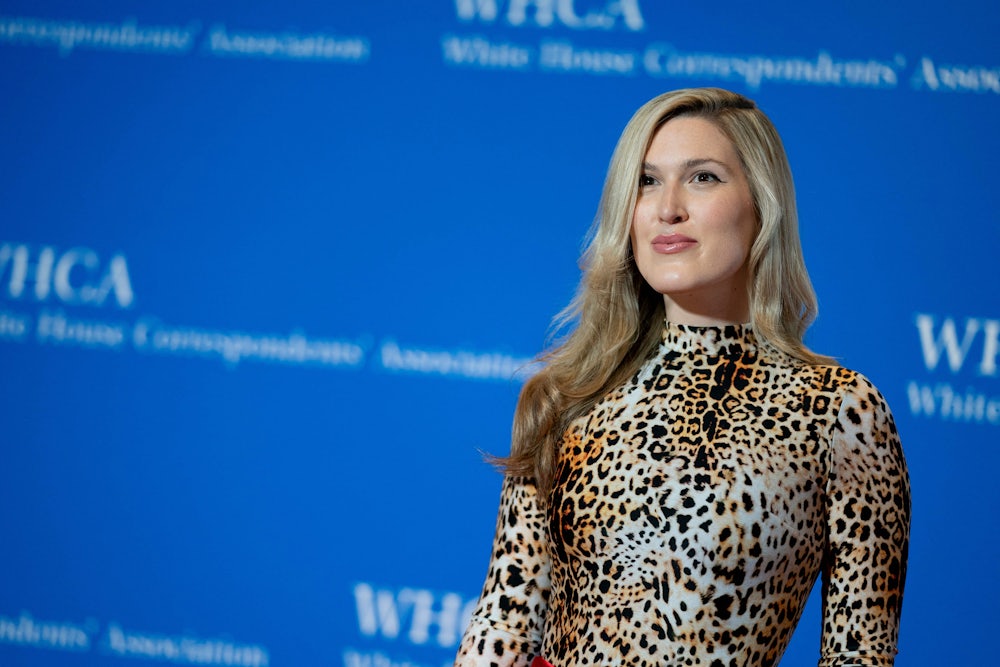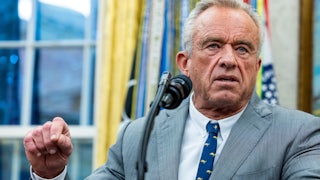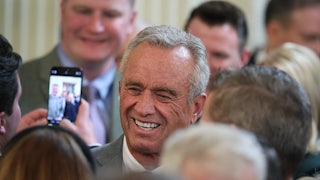We know too much about Olivia Nuzzi’s personal life. There’s her initial firing by New York magazine over an undisclosed affair with then–presidential candidate Robert F. Kennedy Jr. around the time she published a profile of him; the public falling out with her fiancé, political reporter Ryan Lizza—during which she filed and then dropped a protective order against him; a teenage relationship with a much older Keith Olbermann; a new book and New York Times profile claiming she threw away her career for love; recent allegations from Lizza claiming she slept with former South Carolina Governor Mark Sanford; and a song called “Jailbait,” apparently released under the name Livvy when she was 16, which a spokesperson says “was never meant to be taken seriously.”
It’s all scintillating, and it’s all a distraction. The only thing you need to know about Olivia Nuzzi is that she used her position of power, as a journalist, to advise and elevate the world’s most prominent anti-vaccine activist to the most influential health position in the United States. The latest bombshell revelations about what they did or didn’t do together risk obscuring the important part of the story: The beliefs RFK Jr. espouses kill people. These beliefs have already killed people. As secretary of the Department of Health and Human services, he now holds the well-being of millions of Americans in his hands. And Olivia Nuzzi is joking about it in The New York Times.
“All I think about is how this woman was part of mainstreaming this guy,” Aparna Nair, professor at the Department of Health and Society at the University of Toronto, told me. RFK Jr. “will do profound damage on a global scale—that’s all that matters,” she said. The global health program at the Centers for Disease Control and Prevention was among the first to be cut under RFK Jr.’s tenure, and outbreaks of illnesses like Ebola, Marburg, and mpox are now expanding across countries and borders.
As the public fixated on fresh Nuzzi scandals last week, RFK Jr. was instructing the CDC to add language on its website about the possibility of vaccines leading to autism. It’s the latest in his expanding focus on autistic individuals; he has also overseen the creation of a national autism research registry and blamed parents for taking Tylenol during pregnancy.
“In elevating someone who has now become essentially the most powerful person in public health in the country and who is taking a wrecking ball to public health institutions, she has done untold damage,” Gavin Yamey, professor of global health at the Duke Global Health Institute, said of Nuzzi. “She certainly contributed to his rise.”
“It’s not just about a violation of journalistic ethics. It’s so much bigger than that,” Nair agreed. As a historian of vaccination, Nair knows exactly how much work it took over decades to expand access to and establish trust in the safety and necessity of vaccines—and now she’s watching as Kennedy undermines it all in the U.S. and around the world.
The Nuzzi-RFK Jr. story reportedly began with Nuzzi’s profile of him for New York magazine in 2023. RFK Jr. was then a candidate in the Democratic primary for the 2024 presidential race. Nuzzi wrote that he met her with “an unfriendly expression” and took her on a ride in a disgusting vehicle used to take his dogs on hikes. But from there, the story was largely positive. She positioned him as a “spoiler” candidate who could ruin the race for Biden and Trump, “turning the presidential election upside down.” She joked about his antivax views, referring to chickenpox vaccines as “more frightening” than nuclear war, and reported a small sliver of his anti-vaccine activity without getting into greater detail on his views and what they mean for America.
“He’s one of the world’s most dangerous anti-vaccine activists and conspiracy theorists, and she made light of that and really downplayed it and defanged his extreme views,” Yamey said. “She allowed him to argue that he’d just simply been misunderstood.”
In the following months, Nuzzi raised Kennedy’s profile as a dark-horse candidate. In a roundtable for The New York Times in March 2024, she said, “We’re forgetting or purposefully ignoring something rather important about this election: It’s not a two-man race. It’s a three-man race.” She added, “The establishment press has been reluctant to cover Kennedy like a serious contender because they fear they will face criticism for ‘platforming an anti-vaxxer.’ But the establishment press doesn’t get to decide who voters take seriously.” Nuzzi also criticized Biden for not sitting for more interviews or making himself more available to the press. (Nuzzi did not respond to multiple requests for comment for this piece.)
In the Biden years, it was harder for Nuzzi to get the juicy scoops she was accustomed to in Trumpworld, as she called it. One of her better-known pieces was a takedown of Biden based entirely on unnamed sources and her own sense that her lack of access to the president was related not to his notorious mistrust of the press—including Nuzzi, who had written negatively about him before—but because he was declining rapidly. The piece made waves and contributed to calls for Biden to leave the 2024 presidential race.
Nuzzi’s “near-total obsession” with RFK Jr. drove all of her decisions from late 2023 through 2024, Lizza alleged in a recent Substack post. He claims that included “catch-and-kill operations on his behalf, the campaign strategy memos she wrote him, and other journalistic transgressions that have still not been disclosed.”
Nuzzi’s advice on Kennedy’s presidential campaign was also mentioned in The New York Times’ recent profile of Nuzzi, timed to coincide with the release of her new book. The Times profile appears to be a gauzy, even romantic rehabilitation of her image. (It’s hard to imagine an experienced profiler like Nuzzi didn’t know what she was doing, from playing “Bang Bang (My Baby Shot Me Down)” in her convertible Mustang to leaving Dante and the Bible on her kitchen table for reporter Jacob Bernstein to notice.) There’s an implication that Nuzzi took a metaphorical bullet for Kennedy—he survived to get a top spot in the Trump administration, while she was banished to Malibu with the convertible and a coveted job offer to be Vanity Fair’s West Coast editor. “She flamed out and she faded away,” according to a long excerpt of Nuzzi’s forthcoming book in one of the most prestigious magazines in the country.
The New York Times piece skates past Kennedy’s record as health secretary. “I don’t have any interest in offering punditry,” Nuzzi says. The only mention of vaccination comes when Nuzzi makes a joke, according to the author of the piece. When trying to explain her relationship with Kennedy, she says, “Maybe it was the vaccines.”
With the worst measles outbreak in three decades still unfolding and the U.S. status of measles elimination under threat, while vaccine distrust rises, many people aren’t going to find that line very funny. “She seems to have absolutely no sense of what she has enabled, or she does not care, or both,” Nair said.
“Deadly vaccine-preventable illnesses are returning. How can she not feel any sense of connection to that?” Yamey asked. “I’ve not seen any reflections or regrets or remorse.”
In the book excerpt published by Vanity Fair, Nuzzi positions Kennedy as a disloyal lover and herself as a victim of schadenfreude—a female Icarus, as she writes, indicating she thinks her cancellation is more about her ambition than her actions. “I’m not interested in her incredibly bad writing,” Nair said. “Real people are going to become disabled, sick, and die as a consequence of this.” And it could be years before we see the true scale of the damage, she said.
But everyone is a character to Nuzzi, and everything is content: The devastating Los Angeles fires that destroyed some 13,000 homes and killed at least 31 people are an extended and convoluted metaphor for her personal life. In an obtuse metaphor (I think it’s a metaphor? It’s not clear) about placing a loaded gun on her bed stand, she inexplicably talks about gun violence as a major cause of death in America. She takes a serious public health issue and reduces it to a clumsy metaphor (hopefully!) about a failed situationship. Through all of the coverage of Nuzzi and her entanglements, Kennedy is painted as a lothario, an irresistible bad boy, instead of the man who has overseen the termination of thousands of public health employees, slashed funding for state and local health departments, called vaccination a personal choice, and pushed bogus (and harmful) theories about the “cause” of autism.
Nuzzi isn’t acting alone. These puff pieces, the platforms she’s still being given, the breathless updates on the latest rumors—all of these reinforce the principle Nuzzi seems to live by: What matters is the zinger, the juicy tidbit, the shocking reveal.
Perhaps no one can be surprised that the subject of a scandal writes a book anymore. But offering her an editorship showed disregard for the damage she’s caused and the journalistic ethics she’s burned to the ground. The glamorous photo shoots, the breathless gossip on her sordid saga—they all function to rehabilitate the images and careers of people who have done harm. When a major publication repeats a joke about vaccines without mentioning, for instance, the two unvaccinated children who died of measles in the U.S. this year, they contribute to the rise of dangerous actors and they normalize those who helped them into power.
Nuzzi seems to have made a career of mistaking juicy tidbits for the real story. We shouldn’t fall into the same trap.








